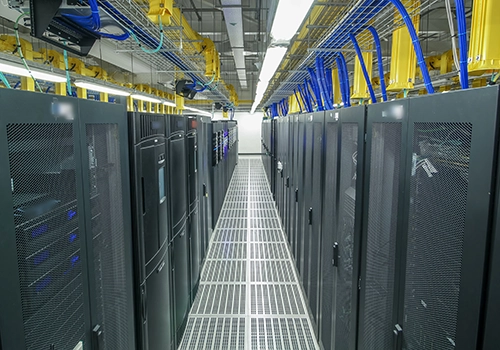Data Center Sustainability for the 21st Century
The path to creating cost-effective, energy efficient, environmentally responsible data centers isn’t an easy one, but Pace® can help. Our data center services support clients throughout the life cycle of their business, from site assessment and remediation support to every aspect of environmental testing – indoors and out. We are the largest American-owned laboratory network with testing facilities and service centers conveniently located across the country. By employing state-of-the-art technology and methodologies, we deliver accurate, reliable, and timely data, enabling our clients to make informed decisions about environmental stewardship and operational efficiency. Our commitment to excellence and customer service has made us a trusted partner for more than 40 years.
Success Through Partnership
Data center operations often demand contributions from experts in various fields. Pace® helps ensure project success through partnerships with many types of organizations and roles. Our commitment to meeting our obligations ensures you have the data you need to meet yours.

Data Center Operations Management

Integrated Facility Management Organizations

Water Treatment Professionals

Environmental Engineers & Architects

Engineering & Construction Firms

Data Center Development Organizations

Industrial Hygiene Professionals
Data Center Site Selection
Brownfield sites offer compelling advantages for data center development, but they also require environmental due diligence. Pace® supports site assessments with reliable testing for biological and chemical contamination.
Data Center Resource Effectiveness
According to government estimates, data centers consumed about 4.4% of total electrical energy generated in the U.S. in 2023 and are projected to consume between approximately 6.7 to 12% by 2028. All that power demands water for cooling IT equipment and maintaining thermal efficiency. Pace® helps data centers improve water usage and increase energy efficiency through proactive maintenance.
The biofilm that typically forms on the inside of water pipes can impact heat exchange efficiency, increase energy consumption, and put additional load on chillers and pumps. Water treaters typically add chemical disinfectants to the water to kill the microorganisms responsible for biofilms. However, too much chemical in the water system can lead to corrosion, lowering efficiency and equipment lifespan. Regular testing of water samples, using a variety of methods to detect bacteria, can ensure proper disinfectant residuals and monitor for the presence of biofilm in the system.
Biofilms can also induce or accelerate corrosion in cooling systems, creating leaks that can damage equipment, reduce thermal efficiency, and ultimately, cause system failure. Preventing MIC through regular monitoring of disinfectant residuals and the presence of microorganisms in your primary and backup cooling systems can help maintain the operational integrity, efficiency, and lifespan of data center cooling infrastructure, thereby minimizing unplanned downtime and costly repairs.
To reduce the demand load on regional and municipal water supplies, many data centers are turning to systems that leverage reclaimed and recycled water. Reclaimed water is treated wastewater used for cooling systems; whereas recycled water is water recycled through the cooling system several times before being discharged as wastewater. Both methods of lowering water consumption may be employed to lower data center water consumption. However, using recycled or reclaimed water for data center cooling can increase the potential for chemically and biologically influenced corrosion, warranting increased water analysis to maintain cooling system reliability and thermal performance.

Legionella in Data Center Water Systems
Dangerous waterborne pathogens, such as Legionella, the bacterium responsible for Legionnaires’ disease, can thrive in data center water systems, including cooling towers, evaporative condensers, and hot water loops. Of these, evaporative cooling systems, particularly cooling towers, carry the greatest documented risk. If contaminated water becomes aerosolized, the bacteria can be inhaled, leading to severe and sometimes life-threatening respiratory infections. Learn More.

The original outbreak of Legionnaires' disease occurred in 1976 during an American Legion convention at the Bellevue-Stratford Hotel in Philadelphia. While less was known about Legionella testing back then, investigations suggest that the bacteria originated in the cooling tower of the hotel's air conditioning system. More recently, one of the deadliest outbreaks of Legionnaire’s disease in the U.S. was tied back to a cooling tower in the South Bronx.
Learn More about Legionella in Cooling Towers in our Info Sheet
New York now requires testing of cooling towers for Legionella. More recently, New Jersey passed sweeping legislation requiring owners and operators of specific buildings, facilities, and public water systems to develop water management plans to prevent and control Legionella infections. With thousands of Legionellosis cases reported every year in the U.S., other states have enacted or are considering comparable regulations.
OSHA and the CDC have established guidelines for preventing Legionella in cooling towers. The CDC’s comprehensive guidance on Legionella control in cooling towers includes recommended water parameters, control measures, and maintenance practices to mitigate the risk of Legionella growth and dissemination. OSHA’s guidelines on controlling and preventing Legionellosis in the workplace include recommendations for the maintenance of cooling towers, evaporative condensers, and fluid coolers. Water Management Planning is a critical element of preventing Legionella in data center water systems.
Legionella Outbreak Response Services
Our expert Legionella outbreak response team is available 24/7. We can help you quickly determine if Legionella is present in your water systems, create a remediation strategy, and even work with you on your communications to the public.
Pace® Water Management Planning Services
Water Management Planning is a critical element of preventing Legionella and other waterborne pathogens in data center water systems. From expert guidance and testing to full-service plan development, we provide the resources you need to comply with ASHRAE 188 and state regulations for Legionella risk management.
Data Center Environmental Compliance Services
Data centers are not known for endangering public health or being heavy polluters of the natural environment. However, there are a few regulations that may apply.
Even when not mandated by law, some data centers voluntarily analyze wastewater discharge for environmental pollutants to ensure safety and build public trust. Common contaminants can include glycol and other refrigerants, metals, corrosion inhibitors, biocides, and anti-scalants.
Many data centers maintain backup generators to ensure continuity of service in the event of a power outage. Diesel fuel is the most common type of fuel used due to its efficiency, reliability, safety, and ease of storage. However, if the data center stores fuel underground, Underground Storage Tank (UST) monitoring rules may apply.
If the data center is owned or operated by the General Services Administration (GSA), they must comply with GSA Public Buildings Service (PBS) Order 1000.7A. This regulation establishes national requirements for effectively managing and overseeing drinking water quality within GSA-managed properties. Requirements include regular testing of drinking water for Legionella, lead and copper, and total coliforms. GSA properties are also required to develop and maintain a comprehensive water management plan.

Additional Resources
Webinar: Introduction to Legionella Testing & Regulations
Webinar: Asbestos in Settled Dust
ESG COMMITMENT
As People Advancing Science®, we are proud to meet or exceed state and federal laws governing waste management and actively work to minimize our environmental footprint wherever possible.

Education
Reporting
Audits
Optimization
Coolers
Recycling
Reducing
Solvent usage and emissions
Waste and solvent disposal
Glass/container disposal
Shipping weight requirements
- Online Education
- Lab Energy Audits
- Reusable Coolers
- Online Reporting
- Courier Optimization
- Solvent Recycling
OUR PROMISE TO YOU
We honor our commitments so you can honor yours™. We
promise to deliver a level of quality that meets your data
quality objectives — supported by personal service, ethical
standards, data transparency, and the highest level of support
possible. People Advancing Science. This is the foundation of the Pace® Promise.
- RELIABLE DELIVERY
- COLLABORATIVE RELATIONSHIPS
- EXCEPTIONAL SERVICE